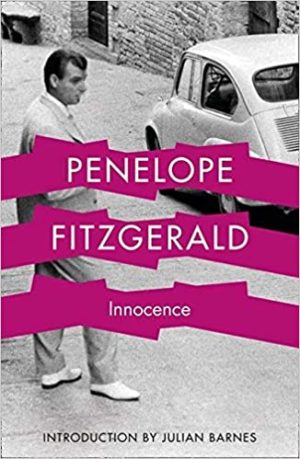There’s something seductive about Fitzgerald’s writing, it’s so gentle and light that it almost seems effortless. It’s not, of course, and that’s the genius of it. No wonder Fitzgerald has become a writer’s writer, with hoards of author fans. If you enjoy a well-written book, I suspect you will like her novels too. Be warned, though, Innocence, like her other books, is not action packed, but rather a funny, contemplative story where a lot more goes on than meets the eye.
Innocence is set in Florence in the 1950s. Chiara is the daughter of the broke Count Ridolfi, owner of a decrepit palazzo and a family history shrouded in sinister myths. Chiara is ‘a beauty, but not thought beautiful in Florence’ (she is too fair), half-American and with no sense of dress. She is a bit of an outsider but doesn’t seem to notice, or even care. She’s a character full of contradictions, careless yet innocent, shy yet eager.
Enter Salvatore, a handsome, bright but emotionally lobotomised (a hint of Asperger’s?) neurologist, from a poor village in the South of Italy. Chiara falls head over heals in love. But Salvatore’s communist, farmer pedigree is not exactly what everyone was hoping for…
Barney, Chiara’s English friend from boarding school comes to advise, but she doesn’t have much experience in love herself and isn’t exactly subtle, neither in physical presence nor demeanour.
Barney was putting on a man’s striped nightshirt which came halfway down her glowing, faintly hairy calves. On the face of it she looked an unlikely adviser in the matters of the heart.
After a tumultuous start with a fair number of insults and misunderstandings, Chiara and Salvatore decide to marry.
Fitzgerald descriptions of Italians and Italy, down to the make of the sowing machines, feel so real that you sometimes forget that this is not a translated novel. You’re only reminded when the English enter the novel in all their pompous Englishness.
These are the funniest and my favourite parts of the novel. Overbearing and snobbish but at the same time intrigued, Barney, her grandmother Lady Jones and the Harringtons, an English couple settled in Florence, are brilliant parodies of the English upper middle class abroad.
Lady Jones had come in default of Barney’s parents. They were escaping the winter elsewhere. ‘The Count is quite delightful. And his sister too, of course.’ She looked round restlessly. ‘If only it was Rome, there would be somebody one knew from the Embassy.’
Fitzgerald’s wry humour seeps through everywhere such as the rational Salvatore’s conclusion that all the time he spends thinking about Chiara must ‘be in some way biologically useful.’ Or when he breaks up with his mistress announcing that ‘your dependence on men as a sex and your subservience to them is quite archaic.’
Salvatore is not the cad this statement might lead you to believe. He, like all the other central characters of this novel has a naïve, innocent (hence the title) outlook on life that, despite good intentions, often turns out to be destructive. An eager clumsiness prevails, of which Chiara is the best example.
Innocence is the kind of book where you find yourself reading sentences over again because they are so cleverly crafted. It’s at once a light read and a profound book. Fitzgerald’s novel should be read for the ride, not the destination. And a magnificent ride it is!
Innocence by Penelope Fitzgerald is published by Fourth Estate, 340 pages.
If you like the sound of this book, you might want to consider Penelope Fitzgerald’s The Blue Flower also reviewed on this blog.





